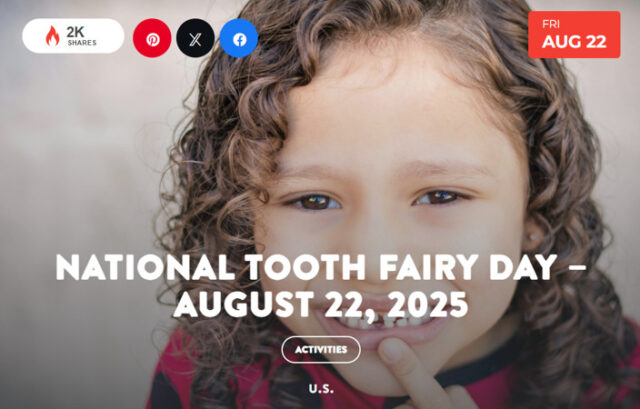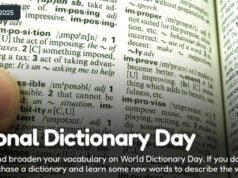
Wiggle a loose tooth and maybe the tooth fairy will collect it on August 22nd during National Tooth Fairy Day. Since the day is celebrated twice a year, recognize the tooth fairy again on February 28th.
- 13th Century – Islamic scholar Ibn Abi el-Hadid referenced the Middle Eastern tradition of throwing a baby tooth into the sky (or “to the sun”) and praying for a better tooth to replace it.
- 1908 – The earliest reference to the Tooth Fairy appears in a “Chicago Daily Tribune” Household Hints column.
- 1920s – Fairies are used to encourage kids to eat their vegetables, go to sleep on time, and clean their teeth.
- 1925 – An advertisement for Fairy Wand Tooth Whitener uses an image of the Tooth Fairy.
- 1927 – Watkins Arnold’s 1927 play for children, “The Tooth Fairy,” debuts.
- 1942 – In an article written by columnist Bob Balfe in the Palm Beach Post, his children received War Stamps to put in their books when they lost a tooth. It was a popular alternative during a time when giving to the war effort was a motivating factor.
- 2004 – The popular children’s cartoon “Peppa Pig” features the Tooth Fairy in one of its episodes.
- 2021 – “The Tooth Fairy” movie debuts, starring Dwayne “The Rock” Johnson and Julie Andrews as the titular characters.
- 2021 – The company, The Tooth Fairy, sponsors National Tooth Fairy Day and the first celebration takes place.
- 2025 – However, for the first time since the poll’s inception, the average tooth fairy gift has cooled off compared to the market, showing a 14% decline from $5.84 to $5.01 in 2025.
- According to Delta Dental’s Original Tooth Fairy Poll® (which it has conducted since 1998), the average tooth fairy gift has correlated with the stock market’s S&P 500 nearly every year, suggesting the tooth fairy could be a good indicator of the U.S. economy’s overall direction.
- The Tooth Fairy collects about 300,000 teeth from children all over the world every night. It’s believed that the Tooth Fairy uses these teeth to build the fairy community where she lives.
- She visits each child around 20 times! Children have 20 baby teeth that will fall out over a few years. As long as each tooth is left under the pillow, the Tooth Fairy will find it!
- Throwing teeth is a common practice: In Turkey, Mexico, and Greece, children traditionally toss their baby teeth onto the roof of their house.
- In India, Korea, Vietnam, and the Philippines, lower teeth are thrown upward, but teeth from the upper jaw are thrown to the floor, to encourage the new adult teeth to grow straight.
- Traditions aren’t always sunny, though—Norwegian and Finnish children are warned of Hammaspeikko, the “tooth troll” who comes for children who don’t brush.
- Burying the Tooth – Kids in Afghanistan bury lost teeth in a mouse hole, while parents in Turkey bury their children’s baby teeth in a place they think will bring their child success.
- Placing It in a Slipper – In the country of South Africa, a lost tooth is placed in a slipper. A magical mouse takes it from the slipper and leaves a gift.
- In a Glass – In Argentina, children put missing teeth in a glass by their bed and hope they’ll get a coin or candy in its place.
- The Tooth in a Box – Most people in Mexico place a lost baby tooth into a small box next to a child’s bed. The legend is that a magical mouse will come to collect the tooth and leave some coins behind.
Sources
Pediatric Dentist Long Island NY
Disclaimer
The information contained in South Florida Reporter is for general information purposes only.
The South Florida Reporter assumes no responsibility for errors or omissions in the contents of the Service.
In no event shall the South Florida Reporter be liable for any special, direct, indirect, consequential, or incidental damages or any damages whatsoever, whether in an action of contract, negligence or other tort, arising out of or in connection with the use of the Service or the contents of the Service. The Company reserves the right to make additions, deletions, or modifications to the contents of the Service at any time without prior notice.
The Company does not warrant that the Service is free of viruses or other harmful components












